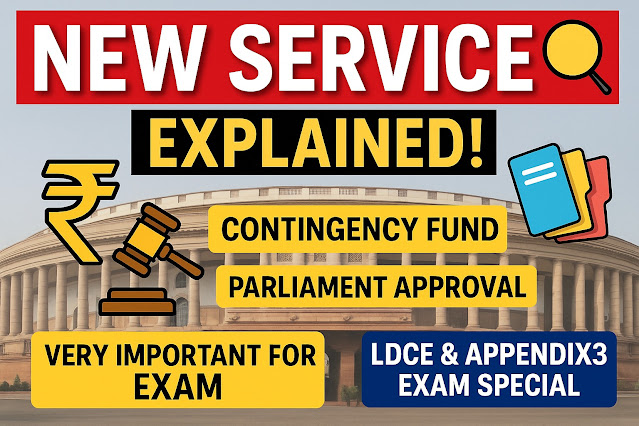Designed to help the candidates appearing the Appendix 3, LDCE, 70% etc of Railway Accounts
Thursday, July 10, 2025
Tuesday, October 20, 2020
New Service / New Instrument of Service
New Service / New
Instrument of Service
● In simple "A service for which there is no provision in the Budget of the year concerned is called NEW SERVICE."
● Definition: Article 115 of Constitution of India and Para 370 of Indian Railways Finance Code - "The expenditure arising out of a new policy decision, not brought to the notice of Parliament earlier (i.e., through Railway Budget), including a new activity or a new form of investment."
● NEW INSTRUMENT OF SERVICE: It is a slight variation of New Service. It refers to relatively large expenditure arising out of important expansion of an existing activity.
● The term "New Service/New Instrument of Service" is governed by the case law decided by the Public Accounts Committee (PAC) from time to time.
● As per PAC recommendations, presently new works estimated to cost more than Rs. 2.5 Crores each are treated as “New Service/New instrument of Service’.
● Normally a New Service/New Instrument of Service should not be undertaken and no expenditure should be incurred on it till the funds for the same are approved by Government and sanctioned by Parliament (through Railway Budget).
● However, in case it becomes Inescapable to incur any expenditure on any New Service/New Instrument of Service before the allotment of funds by the Parliament, an advance is taken from the CONTINGENCY FUND OF INDIA (placed at disposal of Financial Commissioner for Railways) to meet such expenditure.
● Para 382 of I.R.Finance Code Vol I - Applications for advances (from Contingency Fund) required by the Railways shall be made to the Financial Commissioner for Railways giving the following particulars: -
(i) Brief particulars of the additional
expenditure involved;
(ii) The circumstances
in which provision could not be included in the Budget;
(iii) Why it's
postponement is not possible;
(iv) The amount
required to be advanced from the fund with full cost of the proposal for the
year or part of the year, as the case may be; and
(v) The grant or
appropriation under which supplementary provision will eventually have to be
obtained.
A list of
works falling under this category is appended with the "Demands for
Grants".
&&&&&&&&
